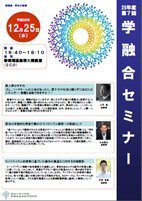AY2013 7th Gakuyugo Seminar
- Date&Time:
- Dec 25, 2013 16:40~18:10
- Venue:
- Large Lecture Room (2C0), New Frontier Science Bldg.

Amateur Study Progress (If you had one hectare of land, could you be self-sufficient in energy and food without relying on nuclear power or oil?
Associate Professor Akira EjiriThe press and the Internet are full of information, but sometimes we get fed up with its inaccuracy and maliciousness. In order not to be swayed by wrong information, I would like to recommend a layman's study. In this section, I will discuss the subject of the sub-title from a simple principle. Specifically, we will consider whether one human being can be self-sufficient in energy and food if one hectare of land is used for solar power, hydroelectric power, biofuel cultivation, rice cultivation, and grazing.

As a prelude to elucidating the molecular mechanisms of instinctive feeding behavior in insects
Associate Professor Shinji NagataBehaviors driven by feeding motivation, such as "I want to eat" in animals, even determine "What do I want to eat?" In order to understand the control mechanism of this instinctive feeding behavior at the molecular level, we have been investigating the molecular mechanisms that regulate this behavior. In order to understand the control mechanism of this instinctive feeding behavior at the molecular level, we are studying it from an endocrinological perspective using insects. We have identified several brain neuropeptide hormones that regulate feeding behavior in the silkworm. We are now trying to understand how these hormones form a network in the brain nervous system to regulate behavior.

Designing countermeasures against high urban temperatures based on life-cycle thinking
Associate Professor Tomohiko IharaDue to the heat island phenomenon and the progress of global warming, the temperature in Tokyo and other cities has been rising significantly. In response, greening is being promoted to reduce the temperature, and heat index forecasting is being implemented to prevent heat stroke. However, from the perspective of life-cycle thinking, it is possible that the measures we truly desire are different. In this seminar, I will give an overview of life-cycle thinking and introduce a case study of its application to the environmental impact assessment of high urban temperatures.
*The contents of this page were developed based on a machine translation.

